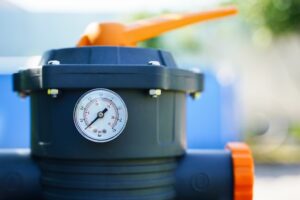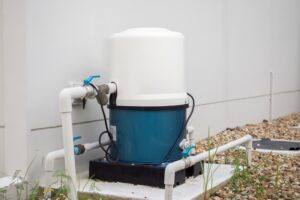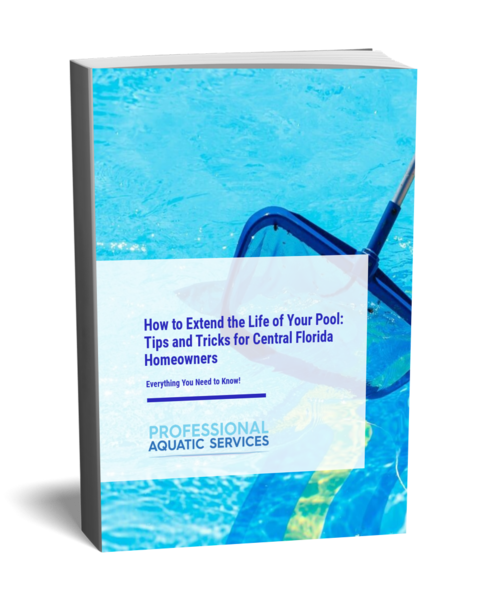A properly maintained pool relies on pool filtration to keep the water clean, clear, and safe for swimming. Without a pump, water becomes stagnant, leading to debris buildup, algae growth, and an increased risk of harmful bacteria.
Some pool owners look for alternatives to traditional filtration, whether to cut costs, reduce energy consumption, or work around a broken pump. But is it possible to maintain water quality without mechanical circulation?
Without proper filtration, pools can quickly become hotspots for contaminants, requiring more chemicals and manual effort. Exploring alternative methods like natural filtration, manual cleaning, and chemical treatments can help mitigate some risks, but do they truly replace a pump?
Understanding the challenges and safety concerns of pump-free filtration is crucial for making an informed decision on maintaining a healthy swimming environment. So, let’s explore.
Table of Contents
ToggleWhat is Pool Filtration and Its Role
Pool filtration is important for keeping your pool water clean and safe. Without proper filtration, dirt, debris, and bacteria build up, making it harder to maintain clear water. The pool pump plays a key role by circulating water through the filter, trapping contaminants before returning clean water back into the pool.
Circulation prevents stagnation, which helps prevent algae growth and reduces the need for excessive chemicals. Filters, like cartridge, sand, or diatomaceous earth, capture tiny particles, improving water clarity. Without a pump, keeping a pool clean requires more manual effort—like using a robotic pool cleaner, a pool brush, and frequent water testing.
Even with alternative methods, balancing chlorine levels, maintaining proper chemical levels, and ensuring adequate water movement are critical. Without circulation, pools can turn into a breeding ground for bacteria, making regular maintenance even more challenging.
Can You Filter a Pool Without a Pump?

Filtering a pool without a pool pump installation is difficult, but not impossible. Without mechanical circulation, new water remains stagnant, allowing debris, bacteria, and algae to accumulate. Since pool filtration relies on movement, stagnant water can quickly turn cloudy and unsafe for swimming.
While alternative methods can help, they require more effort and frequent maintenance:
- Manual Cleaning – Regularly skimming the surface, brushing walls, and vacuuming to remove debris.
- Chemical Balance – Monitoring chlorine, pH, and alkalinity to prevent bacteria and algae growth.
- Gravity-Fed or Passive Filtration – Limited options like DIY gravity filters or natural pools with biofilters.
Without a pump, filtration becomes inconsistent, increasing the risk of poor water quality. Even with extra maintenance, pools without circulation require more chemicals and labor to stay clean.
Alternative Methods for Pool Filtration Without a Pump
Without a pump, maintaining clean and safe pool water requires alternative filtration methods. These approaches can help reduce contaminants, but they demand consistent upkeep and manual effort.
Natural Filtration Systems
Some natural pools rely on plants and biofilters instead of traditional pool filtration. Aquatic plants absorb impurities, while beneficial bacteria break down organic matter. However, this method is typically unsuitable for standard pools, as it requires a specialized ecosystem.
Manual Cleaning Techniques
Since water circulation is limited, regular cleaning is necessary:
- Skimming – Removes floating debris and leaves daily.
- Brushing – Scrubs pool walls and floor to prevent algae buildup.
- Vacuuming – Manually removes settled dirt and debris from the bottom.
Chemical Treatment and Water Balance
Proper chemical maintenance is crucial to prevent bacteria and algae growth:
Chemical | Function | Recommended Frequency |
Chlorine | Kills bacteria and viruses | Daily/As needed |
Algaecide | Prevents algae growth | Weekly |
Clarifier | Improves water clarity | Weekly |
pH Adjusters | Maintains water balance | As needed |
Gravity-Driven Filtration Options
Some pool owners experiment with gravity-fed filtration, where water flows slowly through layered filtering media. While this can work for small water features, it is not a reliable solution for standard pool maintenance.
Without a pump, keeping water clean requires a combination of diligent manual cleaning, chemical balancing, and alternative filtration methods.
Is It Safe to Rely on Filtration Without a Pump?

Skipping a pool filtration system with a pump can pose serious health risks. Without circulation, water remains stagnant, creating the perfect environment for bacteria and algae to thrive. Poor filtration leads to murky water, foul odors, and an increased risk of waterborne illnesses.
Stagnant pools also require more chemicals to maintain safe conditions. Without continuous movement, chlorine distributes unevenly, allowing harmful contaminants to grow in certain areas. This makes manual testing and adjustments more frequent and labor-intensive.
Issue | Cause | Impact |
Bacteria Growth | Stagnant water, poor filtration | Higher risk of infections |
Algae Blooms | Lack of circulation | Slippery surfaces, green water |
Chemical Imbalance | Uneven chlorine distribution | Increased chemical use |
While alternative cleaning methods help, they require constant attention. A pump remains the most effective way to keep pool water safe and manageable.
Key Takeaways: Should You Attempt Pool Filtration Without a Pump?
Skipping a pool filtration pump is not a practical solution for traditional swimming pools. Without proper circulation, water quality declines quickly, leading to algae growth, bacteria buildup, and increased chemical demands. While manual cleaning and chemical treatments help, they require constant attention and do not provide the same efficiency level as a pump.
A pool pump remains the safest and most effective way to maintain clean water. It ensures continuous filtration, proper chemical distribution, and reduced risk of stagnant water-related issues. Instead of eliminating a pump, consider energy-efficient alternatives:
- Variable-speed pumps – Use less energy while maintaining proper circulation.
- Solar-powered pumps – Reduce electricity costs while keeping water moving.
- Smaller, low-flow pumps – Provide filtration without high energy use.
While alternative methods can support water maintenance, relying solely on them is time-consuming and less effective. A pump remains essential for proper pool filtration, ensuring a safe and healthy swimming environment.
The Bottom Line: Prioritizing Safe and Effective Pool Filtration
Effective pool filtration is crucial for keeping the water clean and safe. Without a functioning pump, stagnant water can lead to bacteria, algae growth, and chemical imbalances, making the pool unsafe for swimming. While manual cleaning and alternative methods can help, they require constant effort and do not match the effectiveness of mechanical filtration.
To ensure a healthy swimming environment, consider energy-efficient pump options or professional maintenance services. Professional Aquatic Services can assess your pool’s needs and recommend the best filtration solutions. Consulting with experts helps prevent costly mistakes and keeps your pool in top condition year-round.

